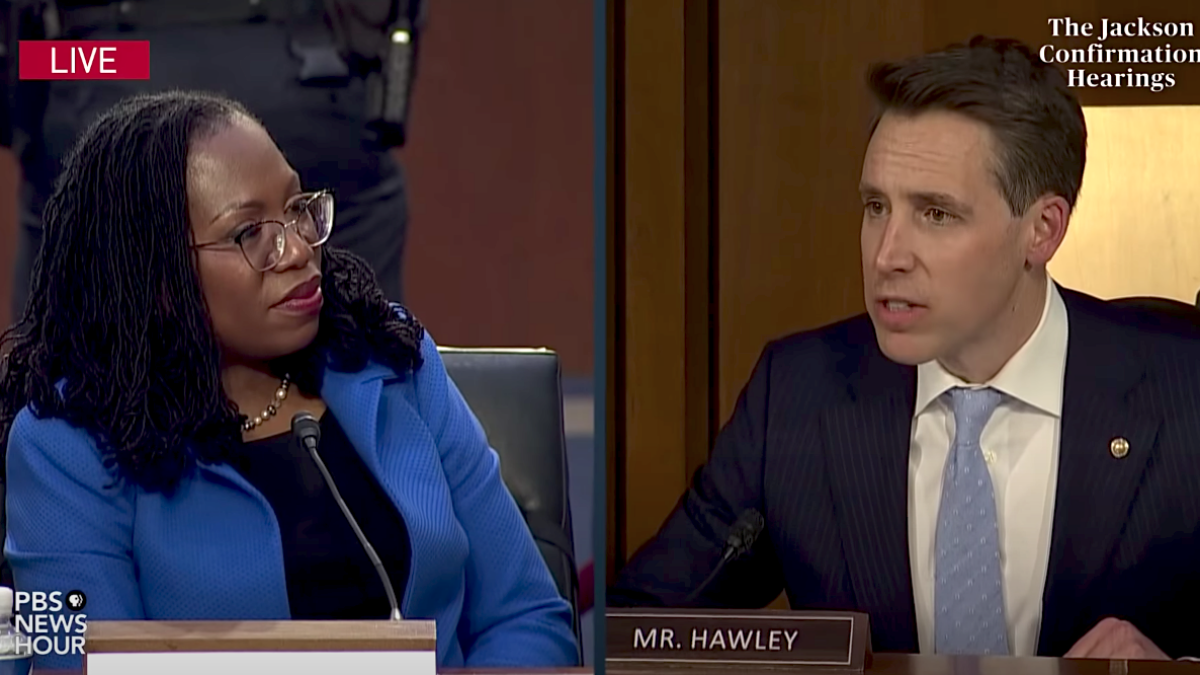Senate Democrats have signaled their intent to begin confirmation hearings for Judge Ketanji Brown Jackson, President Biden’s nominee to the Supreme Court, as early as next week. Thus far, the only information uncovered about Judge Jackson by the intrepid corporate press is that she will be the first black woman to serve on the Supreme Court.
But research released this week by Sen. Josh Hawley, R-Mo., a member of the Senate Judiciary Committee, calls into question Judge Jackson’s judicial philosophy concerning sex predators, particularly sentencing for child sex predators.
Beginning with a paper she authored while a student at Harvard Law School, Judge Jackson appears to have a track record of both advocacy and sentencing decisions demonstrating extreme leniency toward child sex predators. Perhaps more concerningly, her record also demonstrates an attempt to normalize a radical sexual ideology of adults being attracted to minors – categorizing it not as flatly criminal, but simply as misunderstood.
Judge Jackson’s Disturbing Pattern
As Hawley points out in a Twitter thread, beginning in law school, Judge Jackson questioned making convicts register as sex offenders, objecting to the “stigmatization and ostracism” it creates and suggesting the public policy on the issue was driven by a “climate of fear, hatred, and revenge.”
This attitude was not simply that of a law school student pursuing novel legal theories. In fact, what Hawley has laid out is a pattern of behavior from Judge Jackson, one that began when she was in law school, evolved into advocacy while she served on the U.S. Sentencing Commission, and critically, one which she went on to implement as a judge.
While at the U.S. Sentencing Commission, Judge Jackson advocated for eliminating the existing mandatory minimum sentences for child porn, suggesting that at least some people who possess child porn aren’t sexually motivated, but simply “in this for either the collection, or the people who are loners and find status in their participation in the community.” While on the federal bench, Judge Jackson demonstrated a continuous string of departures from sentencing guidelines for sex predators.
In one case involving a sex offender over the age of 18 caught with multiple images of child pornography, the sentencing guidelines called for a sentence of up to 10 years. Judge Jackson sentenced the perpetrator to three months. In another case, where the criminal distributed more than 102 child pornography videos and sent lewd pictures of his own 10-year old daughter, the guidelines recommended 97 to 121 months in prison. Judge Jackson sentenced him to 71 months. Hawley’s Twitter thread lists five other similar sentencing examples.
The White House attempted to dismiss these concerns as “cherry picked elements of her record out of context.” But Judge Jackson’s philosophy toward sex offenders is hardly a one-off, as both her statements and sentencing history demonstrate.
Rather, these views appear to be fundamental to her judicial philosophy – beginning as a law student, then as a practicing attorney, and then as a judge. If confirmed to the Supreme Court, Jackson will presumably continue to apply those legal views, but this time with the imprimatur of the country’s highest court. Senators should certainly take notice.
Critiquing Judge Jackson’s Record Is Not ‘Disrespectful’
Sen. Chuck Grassley, R-Iowa, the lead Republican on the Senate Judiciary Committee, has pledged to hold “a fair, thorough hearing,” adding, “we won’t get in the gutter, like the Democrats did,” appearing to reference the baseless accusations Democrats hurled at Justice Brett Kavanaugh, and the personal attacks levied at Justice Amy Coney Barrett’s adoption of two black children.
Democrats are already claiming that Hawley’s critique of Jackson’s judicial record rises to the same level as, say, entertaining completely unverified gang-rape allegations against a Supreme Court nominee.
“I’m troubled by it because it’s so outrageous,” said Democratic whip Sen. Dick Durbin. “It really tests the committee as to whether we’re going to be respectful in the way we treat this nominee.”
This is, to put it politely, absurd nonsense. Hawley’s assessment of Judge Jackson isn’t a personal or disrespectful attack. It isn’t attacking her adopted children, or interrogating the nominee’s virginity (yes, Democrats and their media allies did that to Brett Kavanaugh). It is squarely in the lane of jurisprudential analysis.
Far from being “outrageous,” it is, quite literally, the job of U.S. senators, who are constitutionally tasked with the role of advice and consent. It is exactly what senators should be doing – scrutinizing the record and judicial philosophy of nominees to every court, and especially to the Supreme Court.
For Republicans to assume they can take it easy on this nominee — because they assume the confirmation is inevitable, they’re concerned about optics, or because her confirmation to replace outgoing liberal Justice Stephen Breyer will not, at this moment, change the ideological makeup of a 6-3 court — is to fundamentally misconstrue what they are there to do.
Advice and consent does not mean, “Well, not this time,” or “She’s going to be confirmed anyway.” It means what it says. It means a thorough review of the nominee’s record, judgment, and judicial fitness to serve on the highest court in the country. This is especially true of Judge Jackson who at just 51 years old would be serving on the court for decades to come, through future ideological shifts including ones that might place the court’s liberals back in charge.
A ‘Thorough’ Hearing Will Involve All of Judge Jackson’s Records
The Biden administration and its backers have offered no substantive defense of Judge Jackson’s record. While the White House has dismissed Hawley’s critique as cherry-picking that “buckles under the lightest scrutiny,” they have failed to demonstrate how. They’ve resorted instead to tossing complete non-sequiturs at Hawley, calling him “an insurrectionist,” and bizarrely trying to tie him to the candidacy of former Alabama Senate candidate Roy Moore (Hawley represents Missouri).
But the flags in Judge Jackson’s record are not cherry-picked, nor are they taken out of context. Rather, they are a pattern. Moreover, hurling unrelated charges at Hawley while failing to offer a defense of Jackson’s sentencing decisions suggests that Democrats know there isn’t one. All of this implies there may be more to uncover – what else do her records at the Sentencing Commission say?
A truly thorough hearing, the kind that Grassley suggests he wants, will involve the Sentencing Commission turning over all of Judge Jackson’s records. It will involve a rigorous examination of her views and record on child sex predators, as well as other topics like the nominee’s stated positions on critical race theory, and how that shapes her jurisprudence.
But to do any of this requires Republicans on the Senate’s Judiciary Committee to demonstrate rigor in their scrutiny of Jackson’s record. This means they must swat aside criticism from Senate Democrats, who have no grounds to claim anything is “outrageous” ever again, not after the circus they unleashed around the confirmation of Justice Kavanaugh. They must demand records from reticent agencies, and they must refuse to accept non-substantive answers from the White House, the nominee, or anyone else.









